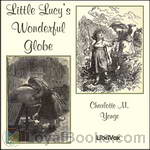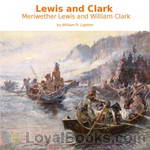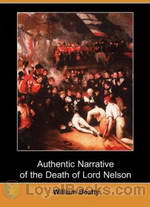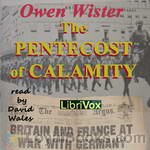|
Books Should Be Free Loyal Books Free Public Domain Audiobooks & eBook Downloads |
|
|
Books Should Be Free Loyal Books Free Public Domain Audiobooks & eBook Downloads |
|
Top Authors |
|---|
|
Book type:
Sort by:
|
By: J. M. Barrie (1860-1937) | |
|---|---|
 Echoes of the War
Echoes of the War
Short stories with dramatic parts about civilian life in London during the First World War. Some humorous moments. By the author of "Peter Pan". | |
 Little White Bird
Little White Bird
"A children's book, sharp social commentary and sad psychological thriller about a man's search for a sense of belonging. All in one amazing and lyrical collection. This is the first book in which Peter Pan starts to appear. His adventure in Kensington Gardens are first narrated here. Other than that, it offers a magical portrait of contemporary London, and a realistic tale of a family to which every one of us could have belonged." | |
 My Lady Nicotine A Study in Smoke
My Lady Nicotine A Study in Smoke
| |
 Courage
Courage
| |
 What Every Woman Knows
What Every Woman Knows
| |
 Margaret Ogilvy
Margaret Ogilvy
| |
 Dear Brutus
Dear Brutus
At a house in the country 8 guests are invited to enter a magical wood to see what might have happened had they made a different choice in life. Even though they are warned away from the wood, they take a chance and enter. The title comes from Shakespeare: "The fault lies in our selves, dear Brutus, not in our stars...," and summarizes the theme of this play: given a second chance, will people still make the same mistakes? | |
 A Window in Thrums
A Window in Thrums
| |
 Better Dead
Better Dead
| |
 Auld Licht Idylls
Auld Licht Idylls
| |
 The Little Minister
The Little Minister
| |
 Auld Licht Idyls
Auld Licht Idyls
| |
By: Charlotte M. Yonge (1823-1901) | |
|---|---|
 The Little Duke
The Little Duke
The Little Duke by Charlotte M. Yonge is historical fiction based on the the life of Richard, Duke of Normandy. He assumes the title of Duke at only 8 years of age, after his father is murdered. The story first appeared in her magazine, The Monthly Packet, as a serial. | |
 Little Lucy's Wonderful Globe
Little Lucy's Wonderful Globe
Travel with Little Lucy around the globe and learn a little geography and small bits about other cultures. | |
By: Alexandre Exquemelin (c. 1645-1707) | |
|---|---|
 The Pirates of Panama
The Pirates of Panama
This volume was originally written in Dutch by John Esquemeling, and first published in Amsterdam in 1678 under the title of De Americaeneche Zee Roovers. It immediately became very popular and this first hand history of the Buccaneers of America was soon translated into the principal European languages. The first English edition was printed in 1684. Esquemeling served the Buccaneers in the capacity of barber-surgeon, and was present at all their exploits. Little did he suspect that his first hand observations would some day be cherished as the only authentic and true history of the Buccaneers and Marooners of the Spanish Main... | |
By: Arthur Empey | |
|---|---|
 Over the Top
Over the Top
Arthur Guy Empey was an American who responded to the sinking of the Lusitania by enlisting with the British Army to fight in France. His experiences in the trenches, including his ultimate wounding and convalescence, became this book. When published in 1917, it was a major hit and helped the recruiting effort when America entered the Great War. If you’ve heard of the horror of trench warfare in WWI and want to see it from below dirt level, Empey offers it all here. Also included is Empey’s popular “Tommy’s Dictionary of the Trenches” which humorously demistifies the slang used by the British soldier. | |
By: George Bernard Shaw | |
|---|---|
 Candida
Candida
Candida, a comedy by playwright George Bernard Shaw, was first published in 1898, as part of his Plays Pleasant. The central characters are clergyman James Morell, his wife Candida and a youthful poet, Eugene Marchbanks, who tries to win Candida's affections. The play questions Victorian notions of love and marriage, asking what a woman really desires from her husband. The cleric is a Fabian Socialist, allowing Shaw—himself a Fabian—to weave political issues, current at the time, into the story. | |
 The Perfect Wagnerite
The Perfect Wagnerite
The Perfect Wagnerite: A Commentary on the Niblung's Ring (originally published London, 1898) is a philosophical commentary on Richard Wagner's Der Ring des Nibelungen, by the Irish writer George Bernard Shaw. Shaw offered it to those enthusiastic admirers of Wagner who "were unable to follow his ideas, and do not in the least understand the dilemma of Wotan." He interprets the Ring in Marxian terms as an allegory of the collapse of capitalism from its internal contradictions. Musicologically, his... | |
 Major Barbara
Major Barbara
George Bernard Shaw's Major Barbara focuses on the family of aristocratic Lady Britomart Undershaft and her estranged husband Andrew, a millionaire armaments manufacturer. Their daughters Sarah and Barbara are both engaged to be married, and Lady Britomart decides to ask Andrew for monetary support. Barbara is a Major in the Salvation Army, and agrees to let her father visit the mission in the East End of London where she works. In exchange, she agrees to visit his munitions factory. The conflict between Barbara's philanthropic idealism and her father's hard-headed capitalism clash when he decides he wants to fund the Salvation Army... | |
 Don Juan in Hell
Don Juan in Hell
Don Juan in Hell is an excerpt (Act 3, Scene 2) from George Bernard Shaw’s Man and Superman. It is often performed as a stand-alone play. In it, three characters from Mozart’s Don Giovanni (Don Juan, Dona Ana, and the statue of the Commendatore, Dona Ana’s father) meet in Hell and, joined by the Devil, have a philosophical debate on a variety of subjects, including Heaven and Hell, men, women and marriage. In the end, they all decide where they will spend eternity. | |
 Heartbreak House
Heartbreak House
On the eve of World War I, Ellie Dunn, her father, and her fiancé are invited to one of Hesione Hushabye’s infamous dinner parties. Unfortunately, her fiancé is a scoundrel, her father’s a bumbling prig, and she’s actually in love with Hector, Hesione’s husband. This bold mix of farce and tragedy lampoons British society as it blithely sinks towards disaster. | |
 Caesar and Cleopatra
Caesar and Cleopatra
| |
By: George Bernard Shaw (1856-1950) | |
|---|---|
 Misalliance
Misalliance
Misalliance, a 1910 play by George Bernard Shaw, is an ironic examination of the romantic entanglements of a varied group of people gathered at a wealthy man's country home on a summer weekend. Most of the romantic interest centers on the host's daughter, Hypatia Tarleton, a typical Shaw heroine who exemplifies his lifelong theory that in courtship, women are the relentless pursuers and men the apprehensively pursued. Hypatia is the daughter of newly-wealthy John Tarleton who made his fortune in the unglamorous but lucrative underwear business... | |
By: Jonathan Edwards | |
|---|---|
 Selected Sermons of Jonathan Edwards
Selected Sermons of Jonathan Edwards
| |
By: United States. Central Intelligence Agency | |
|---|---|
 The 2010 CIA World Factbook
The 2010 CIA World Factbook
| |
By: Henri Poincaré (1854-1912) | |
|---|---|
 Science and Hypothesis
Science and Hypothesis
Jules Henri Poincaré (1854–1912) was one of France’s greatest mathematicians and theoretical physicists, and a philosopher of science. As a mathematician and physicist, he made many original fundamental contributions to pure and applied mathematics, mathematical physics, and celestial mechanics. He was responsible for formulating the Poincaré conjecture, one of the most famous problems in mathematics. In his research on the three-body problem, Poincaré became the first person to discover a chaotic deterministic system which laid the foundations of modern chaos theory... | |
By: Gilbert White (1720-1793) | |
|---|---|
 The Natural History of Selborne
The Natural History of Selborne
The Reverend Gilbert White was the curate of the village of Selborne, a village in Hampshire, from 1784 to his death in 1793, living most of his life in the village. The book is in the form of a collection of letters to two friends, discussing the natural history of the areas that he knew, and natural history in general. White’s intense curiosity and his love for the world about him flow through his simple, straightforward style, and a gentle sense of humour colours many of his anecdotes. | |
 The Natural History of Selborne, Vol. 1
The Natural History of Selborne, Vol. 1
| |
 The Natural History of Selborne, Vol. 2
The Natural History of Selborne, Vol. 2
| |
By: Francis Parkman, Jr. | |
|---|---|
 The Oregon Trail
The Oregon Trail
The book is a breezy, first-person account of a 2 month summer tour of the U.S. states of Nebraska, Wyoming, Colorado, and Kansas when Parkman was 23. Proofed and produced by Karen Merline. | |
By: Edward R. Shaw (1855-1903) | |
|---|---|
 Discoverers and Explorers
Discoverers and Explorers
Tales of the brave and daring explorers that ventured into the unknown “Sea of Darkness” where it was thought monsters and angry gods lived. They dared to sail near the equator which was thought to have such intense heat that it would boil the ocean water. It was also commonly thought at the time that the world was flat, and the ships would fall off the face of the earth. These men overcame these fears to explore and discover new lands. | |
By: William R. Lighton (1866-1923) | |
|---|---|
 Lewis and Clark: Meriwether Lewis and William Clark
Lewis and Clark: Meriwether Lewis and William Clark
Meriwether Lewis and William Clark – In the years 1804, 1805, and 1806, two men commanded an expedition which explored the wilderness that stretched from the mouth of the Missouri River to where the Columbia enters the Pacific, and dedicated to civilization a new empire. Their names were Meriwether Lewis and William Clark. This book relates that adventure from it’s inception through it’s completion as well as the effect the expedition had upon the history of the United States. | |
By: Charles King | |
|---|---|
 The Daughter of the Sioux,
The Daughter of the Sioux,
Charles King (1844 – 1933) was a United States soldier and a distinguished writer. He was the son of Civil War general Rufus King and great grandson of Rufus King, one of the signers of the Declaration of Independence. He graduated from West point in 1866 and served in the Army during the Indian Wars under George Crook. He was wounded in the arm forcing his retirement from the regular army. During this time he became acquainted with Buffalo Bill Cody. King would later write scripts for several of Cody’s silent films... | |
 An Apache Princess A Tale of the Indian Frontier
An Apache Princess A Tale of the Indian Frontier
| |
 Sunset Pass or Running the Gauntlet Through Apache Land
Sunset Pass or Running the Gauntlet Through Apache Land
| |
 Tonio, Son of the Sierras A Story of the Apache War
Tonio, Son of the Sierras A Story of the Apache War
| |
 Warrior Gap A Story of the Sioux Outbreak of '68.
Warrior Gap A Story of the Sioux Outbreak of '68.
| |
 To The Front A Sequel to Cadet Days
To The Front A Sequel to Cadet Days
| |
 Marion's Faith.
Marion's Faith.
| |
 Campaigning with Crook and Stories of Army Life
Campaigning with Crook and Stories of Army Life
| |
 Under Fire
Under Fire
| |
 A Wounded Name
A Wounded Name
| |
 A War-Time Wooing A Story
A War-Time Wooing A Story
| |
 Foes in Ambush
Foes in Ambush
| |
 Trumpeter Fred A Story of the Plains
Trumpeter Fred A Story of the Plains
| |
 Kitty's Conquest
Kitty's Conquest
| |
By: Charles King (1844-1933) | |
|---|---|
 Starlight Ranch And Other Stories Of Army Life On The Frontier
Starlight Ranch And Other Stories Of Army Life On The Frontier
Five stories of Army life in the mid to late 19th century. Charles King (1844 – 1933) was a United States soldier and a distinguished writer. He wrote and edited over 60 books and novels. Among his list of titles are Campaigning with Crook, Fort Frayne, Under Fire and Daughter of the Sioux. | |
By: William Beatty, M.D. (1773-1842) | |
|---|---|
 The Death of Lord Nelson
The Death of Lord Nelson
“The Surgeon of the late illustrious Lord NELSON feels himself called upon, from the responsible situation which he held on the eventful day of the 21st of October 1805, to lay before the British Nation the following Narrative. It contains an account of the most interesting incidents which occurred on board the Victory. (Lord NELSON’s flag-ship) from the time of her sailing from England, in the month of September, till the day of battle inclusively”. – William Beatty | |
By: Owen Wister (1860-1938) | |
|---|---|
 The Virginian
The Virginian
Ostensibly a love story, the novel really revolves around a highly mythologized version of the Johnson County War in 1890’s Wyoming … The novel takes the side of the large ranchers, and depicts the lynchings as frontier justice, meted out by the protagonist, who is a member of a natural aristocracy among men. | |
 The Dragon of Wantley
The Dragon of Wantley
A novel, The Dragon of Wantley, was written by Owen Wister (best known as the author of The Virginian) in 1892. Published by Lipincott Press, the story is a comic "burlesque" (in the author's words), concerning the "true" story of the Dragon. It is a romantic story set at Christmastime in the early 13th century. The book was a surprise success, going through four editions over the next ten years. This is the 1895 edition. | |
 Red Men and White
Red Men and White
These eight stories are made from our Western Frontier as it was in a past as near as yesterday and almost as by-gone as the Revolution; so swiftly do we proceed. They belong to each other in a kinship of life and manners, and a little through the nearer tie of having here and there a character in common. Thus they resemble faintly the separate parts of a whole, and gain, perhaps, something of the invaluable weight of length; and they have been received by my closest friends with suspicion. ...When... | |
 Philosophy 4: A Story of Harvard University
Philosophy 4: A Story of Harvard University
Owen Wister's wry humor enlivens this comedic story of three sophomores during exam week at Harvard. | |
 Lin McLean
Lin McLean
Lin McLean is an unaffected, attractive young cowboy in the Wyoming territory before statehood. This book is various stories in his life. | |
 The Jimmyjohn Boss and Other Stories
The Jimmyjohn Boss and Other Stories
This is the fifth published book of Owen Wister, author of the archetypical Western novel, The Virginian. Published in 1900, it comprises eight Western short stories. | |
 The Pentecost of Calamity
The Pentecost of Calamity
Nonfiction. Appalled by the savagery of World War I, Owen Wister in 1915 published an attempt to move the United States out of neutrality into joining the Allies against Germany. His aim was the quicker defeat of that nation. (Wister: “the new Trinity of German worship – the Super-man, the Super-race, and the Super-state.”) He was but one of many literary personages who joined in this effort. A moving quote: “Perhaps nothing save calamity will teach us what Europe is thankful to have learned again – that some things are worse than war, and that you can pay too high a price for peace; but that you cannot pay too high for the finding and keeping of your own soul.” | |
 Lady Baltimore
Lady Baltimore
Augustus visits King's Port, South Carolina, at the request of his Aunt Carola, and at her expense. She wants him to research geneaologies and records to find proof that he is descended from royalty so that he can join her exclusive club, the Colonial Society. While there, he becomes involved in a love affair between John Mayrant and Eliza La Heu. | |
 A Straight Deal or The Ancient Grudge
A Straight Deal or The Ancient Grudge
| |
 Mother
Mother
| |
 How Doth the Simple Spelling Bee
How Doth the Simple Spelling Bee
| |